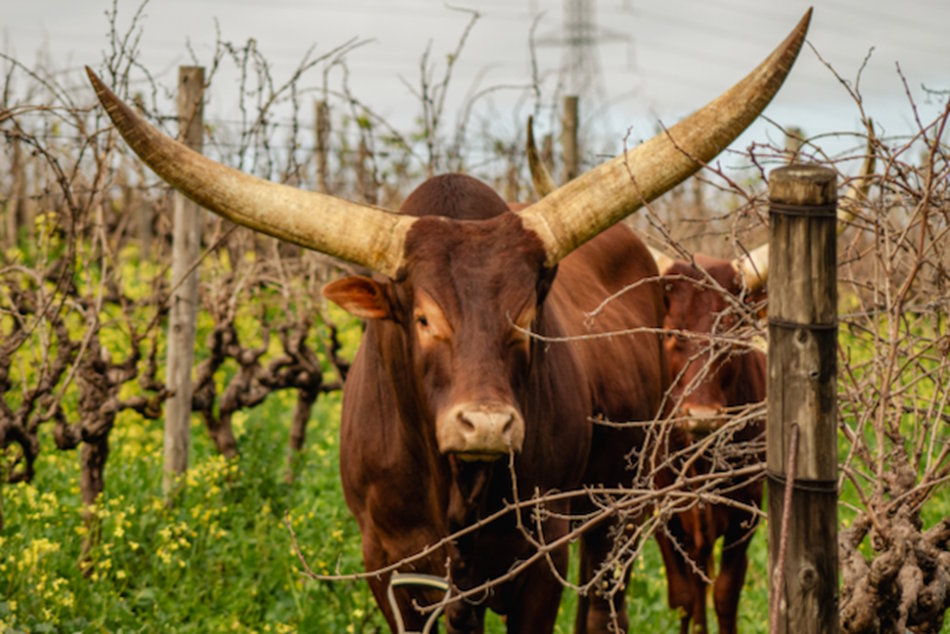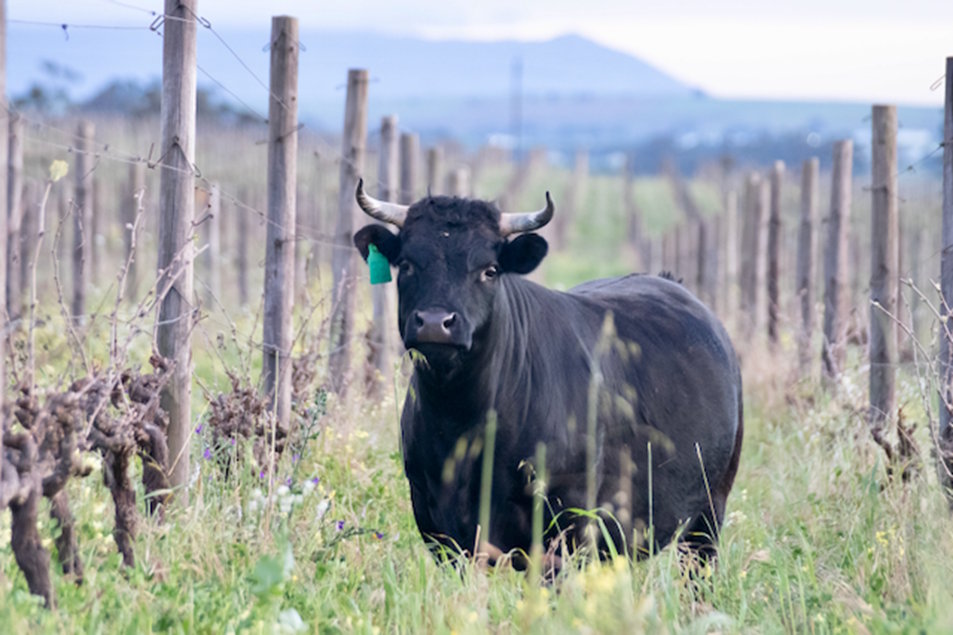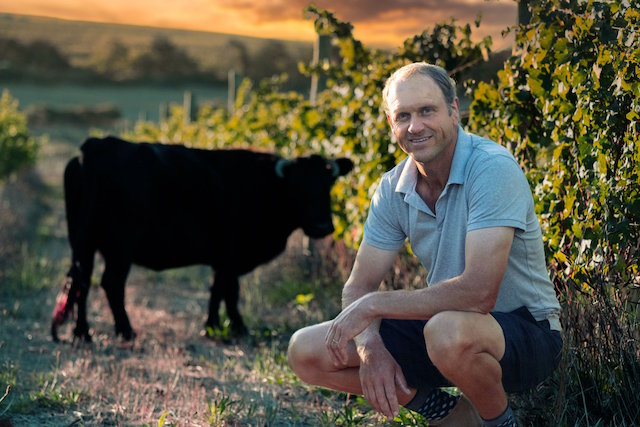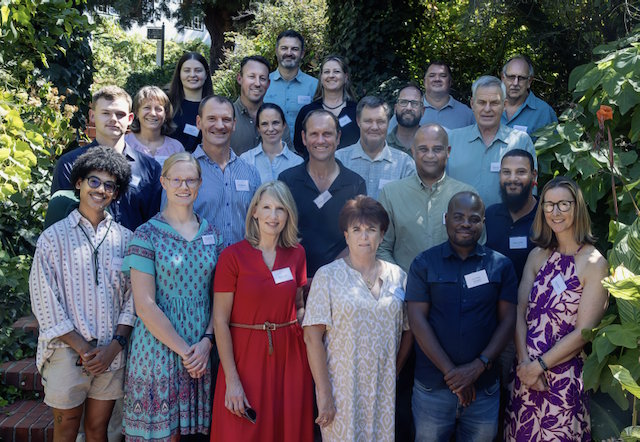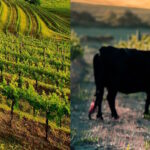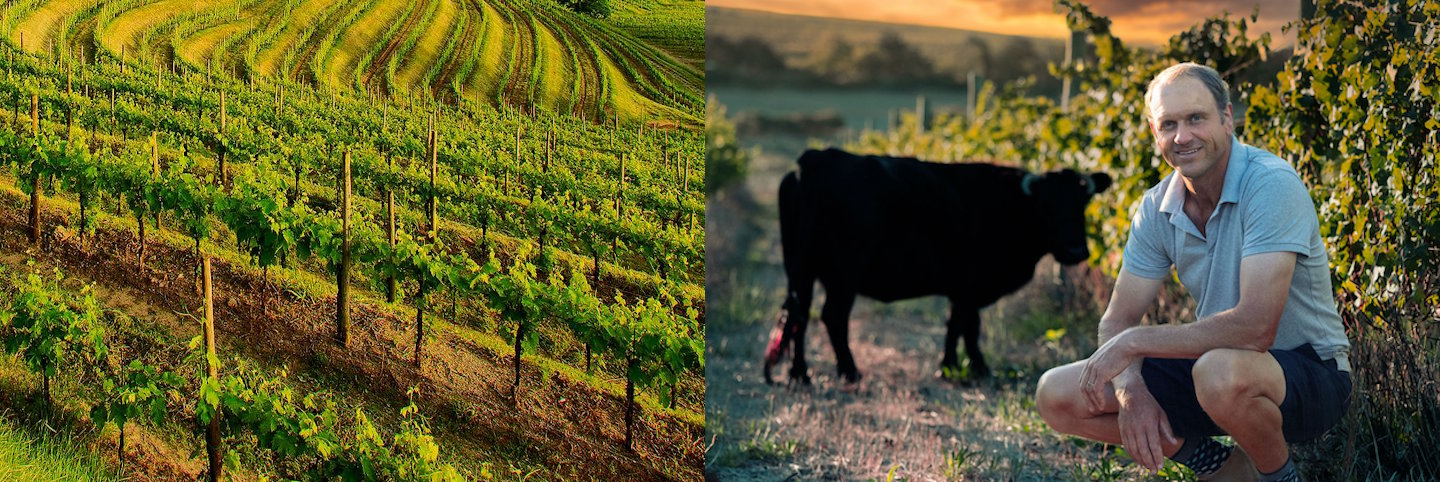
Study on regenerative wine farming takes bull by the horns
- New Stellenbosch University-led study tests whether the use of cattle and cover crops can improve vineyard sustainability.
- South Africa Wine is funding the study expected to help the industry make more informed decisions on future farming.
- Hartenberg Wine Estate hosts pioneering real-world trial of regenerative viticulture
Stellenbosch, 21 May 2025 – As the wine industry gathers for the South Africa Wine Summit this week, a bold new research project is shining a spotlight on how the use of cattle in vineyards could help future-proof the sector in the face of various challenges.
The three-year ReGenWine project, one of the most comprehensive scientific efforts to date to test the potential of regenerative viticulture in a real-world setting, was launched recently. It is being conducted by a multidisciplinary team of Stellenbosch University (SU) researchers, funded by industry body South Africa Wine, and taking place mainly at Hartenberg Wine Estate outside Stellenbosch in the Cape Winelands of the country’s Western Cape province.
While Hartenberg is well-known for its striking Ankole cattle – a large-horned breed that has become part of its visual identity – the ReGenWine study uses Dexter cattle, a smaller and more manageable breed, well suited to the tight layout and conditions of vineyards.
“This is a proof-of-concept study,” said Professor Melané Vivier, the director of SU’s South African Grape and Wine Research Institute, and head of the project. “We’re looking at how to work with nature rather than against it – and whether that can deliver measurable benefits for wine farmers.”
Timely research for a changing industry
The launch of ReGenWine comes as the South African wine industry confronts growing pressure to innovate in the face of climate shocks, rising input costs, and changing consumer expectations. At the 2025 South Africa Wine Summit taking place in Stellenbosch on Thursday 22 May, these challenges will be front and centre.
“Everywhere I go these days, people are talking about sustainability,” said Gerard Martin, South Africa Wine’s executive for research development and innovation. “They’re asking about regenerative farming and what it might mean for their winemaking and their business. This study will generate valuable knowledge to help the industry make more informed decisions.”
Deep roots and progressive ambitions
At the heart of the study is Hartenberg Wine Estate, a historic farm founded in 1692 that has become a frontrunner in regenerative wine farming.
Hartenberg has gradually shifted its practices over the past two decades, introducing multi-species cover crops, composting and biological pest control. But the farm’s transition gained momentum in 2017 with the adoption of holistic grazing – integrating livestock into their vineyards.
Earlier this year, Hartenberg became the first wine estate in South Africa, and only the second globally, to be verified under the Ecological Outcome Verification (EOV) framework – an evidence-based standard for monitoring and improving soil and plant health.
“When we brought the animals in, everything changed,” said Wilhelm Joubert, viticulturist at Hartenberg. “We’ve seen the land come alive again – from the return of earthworms and dung beetles to improved soil structure and biodiversity.”
Testing the model in working vineyards
ReGenWine is bringing rigorous, multidisciplinary research to a global movement that is growing fast but is often driven more by practice and anecdote than by scientific evidence. The goal is to find out whether regenerative methods can improve soil and vine health, maintain wine quality, and strengthen long-term sustainability – both ecologically and economically.
The model combines several elements typical of regenerative viticulture:
- Cover crops (oats and grasses) are planted between vineyard rows to protect soil, retain moisture, suppress weeds, and support biodiversity.
- Cattle are brought in to graze the cover crops after harvest and before new vine growth (this timing avoids damage to leaves or grapes).
- Their manure and urine replenish the soil, reducing the need for chemical fertilisers.
- The animals gain weight and can be sold or used for meat in the farm’s restaurant, creating an additional income stream.
The trial is testing whether this integrated approach will strengthen soil health, support vine performance, and reduce input costs – all while at least maintaining grape and wine quality.
Five teams, one mission
To capture the full impact of regenerative viticulture, the ReGenWine project brings together SU researchers from different disciplines and faculties in five interconnected teams:
- Soil system – measures carbon levels, microbial activity, and soil structure to assess biological and physical changes.
- Grapevine to wine system – tracks vine growth, grape development, and juice composition using field measurements and remote sensing.
- Cover crop and animal system – studies livestock integration, feed intake, movement patterns, and nutrient cycling.
- Economic and environmental circularity – models input-output flows across different vineyard setups, analyses return on investment, and evaluates lifecycle impacts.
- Project and knowledge coordination – ensures effective project management and that data is properly stored and shared with participants and the broader industry.
Foundation for the future
The project is building on a pre-trial study from 2022 to 2024, and the ReGenWine team hopes to generate a robust base of evidence that can inform future decisions in wine farming.
“We won’t answer all questions with one study,” said Vivier, “but we are working to provide a model that others can build on – and to provide a foundation for innovation in the future.”
“It’s also about positioning,” added Martin. “We’re showing that South Africa isn’t just following global trends – we can deliver world-class outcomes when we work together.”
Media contacts:
- Stellenbosch University: Julia Harper, 072 535 0204, jrs@sun.ac.za
- South Africa Wine: Gerard Martin, 082 814 6657, gerard@sawine.co.za
- Hartenberg Wine Estate: Andrea Els, 079 863 9969, wine@hartenberg.co.za


